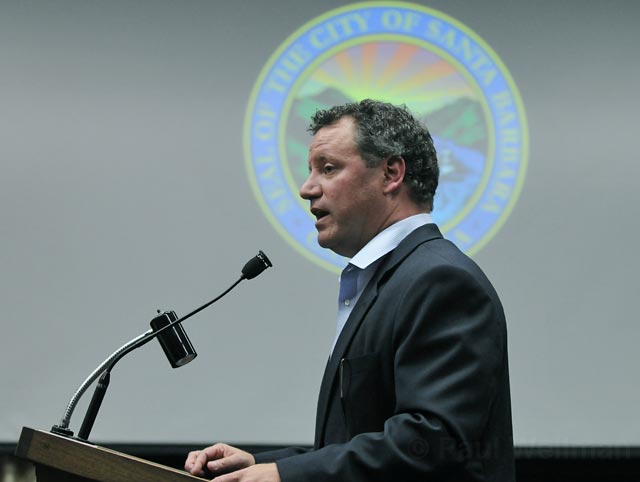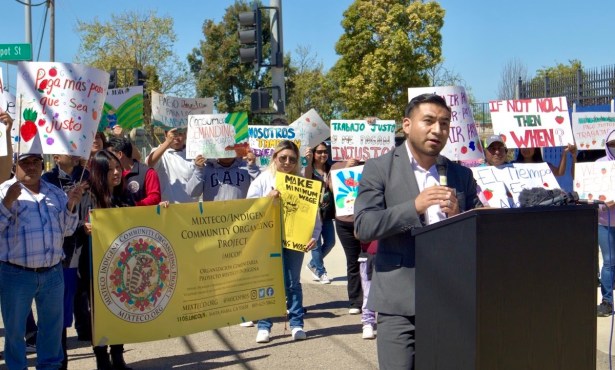The Dave and Das Show
Williams Blasted for Cutting Redevelopment; Says Schools Were Saved

Assemblymember Das Williams and Dave Mullinax, a lobbyist for the League of California Cities, have long been political frenemies, but in the wake of the State Legislature’s passage of a painfully cut budget last week, the adversarial nature of their affection got the upper hand. Last week, Mullinax teed off on Williams — a former Santa Barbara city councilmember now serving his first term in Sacramento — for turning his back on former colleagues and voting in favor of two bills that will inflict significant harm on redevelopment agencies throughout the state. The first bill would abolish all redevelopment agencies outright; the second would allow cities, like Santa Barbara and Goleta for example, to reconstitute those agencies but only if they pay the state what Mullinax terms an “extortionate” fee. For the City of Santa Barbara, that would be $7.14 million, and for Goleta it would be $1.23 million. Williams, Mullinax noted, voted for both bills. And on the day of the vote, he said, Williams’s reelection committee sent out an invitation to a birthday party/political fundraiser he was hosting. “I can tell you, not all the elected who got that were real thrilled,” Mullinax stated.

For his part, Williams has no apologies. “We saved schools from being cut by two weeks this year,” he said. “That would have been a disaster. If I have a choice between schools and redevelopment agencies, I’m taking schools.” As for the invitation, Williams acknowledged the timing could have been awkward for some. But of the 10,000 people who got the mailer, he said, only five or so were elected officials who just saw their redevelopment agencies hacked.
From the start of this year’s budget meltdown — and with a deficit weighing in at $26 billion — Governor Jerry Brown made it clear he wanted to kill redevelopment agencies. Not only do they enjoy an unsavory reputation — political pork at its worst and most unnecessary — they suck up $1.8 billion a year in revenues that could otherwise go to schools, counties, and other local governments. Mullinax and the League fought back tooth and nail. For many cities, redevelopment agencies are absolutely essential. Were it not for redevelopment, there would be no Paseo Nuevo mall in Santa Barbara, and hundreds of affordable housing units would never have been built. Likewise, the City of Goleta could never hope to build the admittedly controversial downtown flood-control project (now on the drawing boards) that’s necessary before real estate developers and property owners will invest in Old Town.
Last year, the League got a ballot initiative passed — Proposition 22 — that would protect local governments from fiscal raids launched by the state. Because of this, Brown was legally precluded from merely eviscerating the offending redevelopment agencies; he had to kill them outright to get their funds. In response, the League offered to have member agencies “voluntarily” pony up $2 billion in revenues for the state. But in exchange, it wanted extra years tacked on to expiration dates of the state redevelopment agencies. Williams said the quid pro quo demanded by the League amounted to “500 percent in interest,” and rejected it. He said he would have gone for something more reasonable. Williams complained the League overplayed its hand, made far too few concessions, made them too late, and failed to acknowledge that in the same time the state’s general fund has shrunk by one-third, redevelopment agencies’ revenues have increased three-fold.
It’s only because we offered them something that we’re in this position,” Williams said.
Mullinax, a congenial pessimist when it comes to Sacramento politics, said the League would file a lawsuit with the California Supreme Court to block the two bills, arguing they violate Prop. 22. Williams expressed confidence that the bill to abolish redevelopment agencies — taken in isolation — can weather legal challenge. He expressed concern, however, that the companion bill — to force districts to pay the state for permission to resurrect these agencies — might be vulnerable. “It’s only because we offered them something that we’re in this position,” Williams said. He said the Legislature could cure the problem by voting again, but this time only to do away with redevelopment agencies. “And the votes are definitely there,” he said.
It remains to be seen what impact any of this will have on local redevelopment agencies. Santa Barbara could pay the “extortion” fee, but would have to reduce funding for projects now in the pipeline. Goleta has already signed financial documents obligating the flood-control funds, and it’s unlikely the Legislature would undo that.



